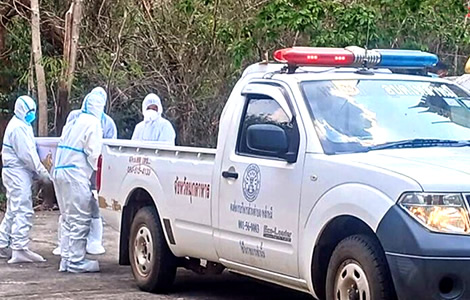Thai officials deny rumours of more anthrax deaths in Mukdahan after confirming first fatal case in 30 years. One patient remains under watch as authorities enforce lockdowns, vaccinate livestock, and urge the public to avoid raw meat and report sick animals.
Thai Ministry of Public Health officials are scrambling to contain an anthrax outbreak in the remote northeastern province of Mukdahan, after denying media speculation on Saturday that two or even three people had died; only one fatality has been confirmed so far—the first anthrax-related death in Thailand in 30 years. According to medical experts, the disease typically affects hoofed animals and is usually transmitted through the consumption of raw or undercooked meat from infected livestock, though in certain conditions, it can also spread via airborne spores. Authorities are now moving swiftly to contain any further transmission and are urging the public to remain vigilant and cooperate fully with control measures.

Health authorities in Mukdahan have denied media reports of a second anthrax-related death in the Don Tan district. The province has recorded only one fatality — Thailand’s first in over 30 years.
The clarification came after a local livestock officer claimed a second person had died. Some television stations also reported that three people had died. However, provincial health officials have firmly rejected those claims.
In a Facebook statement issued on Saturday afternoon, Mukdahan’s public health office said the death toll remained at one. It confirmed that three suspected cases were investigated. PCR testing showed that two individuals were not infected.
Only one additional patient under observation as officials confirm a single fatality and dismiss media rumours
Only one additional patient is still being monitored. That person is being treated at Mukdahan Hospital. Officials say their condition is stable.
The first confirmed fatality was reported on Wednesday. The victim reportedly butchered beef from a diseased cow. This triggered immediate concern in the local community.
Since then, a full-scale response has been launched. Livestock and health teams are working together to contain the outbreak. As a precaution, 638 people identified as being at risk have been given antibiotics.
Of this group, 36 people helped butcher the infected animal. Another 472 consumed beef that may have carried anthrax bacteria. The rest were close contacts, including household members of the butcher.
Meanwhile, efforts to vaccinate animals in the area are ongoing. On Saturday, another 124 cattle were vaccinated. This brought the total number of inoculated animals to 1,222.
Disease control zone declared as animal vaccinations increase and human exposure response continues
All of these animals are within a five-kilometre radius of the infection site. This area now falls under a strict disease control zone. Movement of animals and meat in or out of this zone is banned.
Moreover, health officials have stepped up environmental controls. Disinfection efforts are underway. Livestock officers are checking all animals for signs of illness. Animal health documents are also being inspected.
Dr Weerawat Manosutthi, a senior physician with the Department of Disease Control, spoke at a press conference on Friday. He explained how anthrax spreads and why the public should stay alert.
Anthrax, he said, is caused by the bacterium Bacillus anthracis. It affects hoofed animals such as cows, buffaloes, goats, and sheep. Pigs, cats, and dogs are more resistant and rarely affected.
Anthrax infects humans through contact, ingestion or inhalation depending on level and route of exposure
Humans can be infected in three ways. The most common is through direct contact with infected meat or carcasses. When anthrax bacteria enter through cuts or wounds, skin infections occur.
Infected individuals develop swollen lymph nodes and ulcers, usually within seven days. This is called cutaneous anthrax, and it is the most treatable form.
However, people can also get infected by eating undercooked meat. This can cause intestinal anthrax, which leads to severe stomach pain, vomiting, and high fever.
Inhalation is the rarest but most dangerous route. People who breathe in anthrax spores may develop pulmonary anthrax. According to Dr Weerawat, spores can survive in soil for up to 10 years.
“If we inhale spores from soil or grass, they can enter the lungs and cause serious illness,” he warned. “This is why we stress avoiding exposure to contaminated soil, especially for people with open wounds.”
Soil contamination a long-term concern as spore detection with community safety measures ongoing
Because of the long-lasting nature of spores, officials say animal monitoring will continue for five years. Human surveillance, meanwhile, will last for at least 60 days.
Dr Weerawat also urged the public to take precautions. People handling meat should wear gloves and wash their hands thoroughly. He stressed that meat should be cooked fully before eating.
Dr Saowaphak Hinchoi, a senior veterinarian, added further details. Her team has traced the outbreak to a single cow in Mukdahan. The animal was slaughtered and its meat was shared in the community.
Tests are underway on soil samples from the suspected contamination site. “We’re trying to detect spores in the area where the animal died,” she said. “This will help us map future risk zones.”
Spores are most dangerous where blood from infected animals has seeped into the soil. “These are hot spots. They must be buried and covered with lime,” Dr Saowaphak said.
Soil is the main infection hazard as officials warn against contact and stress importance of proper handling
She explained that spores are not airborne. “They’re too heavy to float in the air,” she noted. “They fall to the ground and stay there. That’s why contact with contaminated soil is risky.”
Local officials have also advised residents not to dissect dead animals. “Report any sudden animal deaths to the livestock office,” Dr Saowaphak urged. “Do not touch the carcass under any circumstances.”
Vendors in the district say the outbreak has hurt their businesses. Many customers are now avoiding beef. One local butcher said his sales had dropped by more than half since the news broke.
Still, health officials emphasise that cooked meat is safe to eat. “Proper cooking kills the bacteria,” said Dr Weerawat. “Meat from certified sources can be eaten without risk.”
Officials impose meat movement ban as vendors report losses but stress cooked meat remains safe to eat
The Don Tan district chief has banned the transport of animals and raw meat. Meat sales, however, are still allowed if the product is properly cooked and comes from trusted suppliers.
Although the outbreak is classified as an epidemic, officials stress that the situation remains under control. There is no evidence of human-to-human transmission. All known cases have involved direct animal exposure.
Thailand is vigilant although well placed to deal with Monkeypox as Sweden confirms its first new variant case
In the meantime, residents in Mukdahan and surrounding provinces are urged to stay cautious. Authorities say cooperation from the public is vital to stop the disease from spreading further.
Join the Thai News forum, follow Thai Examiner on Facebook here
Receive all our stories as they come out on Telegram here
Follow Thai Examiner here
Further reading:
Second case of monkeypox in Bangkok identified in a 47-year-old who had sex with foreign men
Mysterious African monkeypox sufferer arrested after illegally crossing the border into Cambodia
Monkeypox case in Thailand confirmed in transit passenger at Suvarnabhumi Airport last week
Thailand Pass to be used in Monkeypox screening at airports with new RT-PCR test for the disease


















